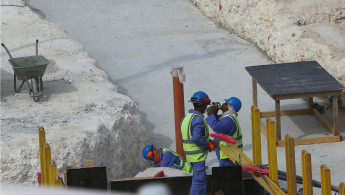Qatar rejects criticism over migrant worker rights
Qatar insisted Thursday it was "committed" to improving conditions for its huge number of migrant labourers, as a new report by a rights group revealed that more than 400 migrant workers from India and Nepal were killed last year.
Doha disagrees with some of the assertions made in the report, citing "significant changes" aimed at improving working conditions for manual labourers imported to the tiny desert state.
Officials have made efforts to boost the number of labour inspectors, provide better housing for workers and crack down on employers and labour recruiters who break Qatari law, said the labour ministry.
Amnesty International said on Thursday that the 2022 World Cup host was failing to deliver on reforms for its migrant workers - a year after Qatar announced plans to improve conditions for low-paid labourers building its snaking highways, luxury hotels, glitzy stadiums and vertigo-inducing skyscrapers.
Like other energy-rich Gulf nations with relatively small local populations, Qatar relies on more than a million guest workers - many of them drawn from South Asian nations including India and Nepal.
The report, Promising little, delivering less: Qatar and migrant labour abuse ahead of the 2022 Football World Cup, was released a day after three major World Cup sponsors - Adidas, Coca-Cola and Visa - publicly pressured soccer's world governing body, Fifa, to push Qatar to do more to improve labour conditions.
"We continue to be troubled by the reports coming out of Qatar related to the World Cup and migrant worker conditions," credit card giant Visa said, adding that it had expressed its "grave concern" directly to football's top body.
Coke said it was also pressing Fifa to demand more labour reforms from Qatar, after fresh accusations from rights group Amnesty that labourers in the tiny gas-rich country were dying in their hundreds.
Some 440 migrant workers from India and Nepal - the two countries with the largest number of migrants working on World Cup projects - died in 2014, Amnesty said, citing their governments' figures - but without detailing how they were killed.
| We've had a year and not much has changed. For us that's a really important thing. There's a matter of urgency - Mustafa Qadri, Amnesty |
"We expect Fifa to continue taking these matters seriously and to work toward further progress," the company said.
But Qatar said that progress had been made.
Promoting human rights for guest workers and others was a "strategic choice and the backbone of the country's comprehensive constitutional, economic, social and cultural reform policy", said Abdullah Saleh Mubarak al-Khulaifi, of the ministry of labour and social affairs.
"We are all dealing with the unique challenges brought about by rapid economic growth and the high population of expatriate workers seeking better opportunities," the ministry said, adding that it was "committed to effective and sustainable change".
In May 2014, officials outlined plans for legislation that could see an end - at least in its current form - to the controversial kafala system that ties expatriate workers to a single employer.
The draft law also would allow workers to obtain exit visas without having to secure employers' consent.
Khulaifi added that, although he could not provide an exact time frame, he hoped the law would come into effect by the end of the year.
However, rights groups say the existing policies left workers open to exploitation and abuse.
"Without prompt action, the pledges Qatar made last year are at serious risk of being dismissed as a mere public relations stunt to ensure the Gulf state can cling on" to one of the world's premier sporting events, reported Amnesty.
"We've had a year, and not much has changed. For us that's a really important thing," Amnesty's Gulf migrant rights researcher Mustafa Qadri said in an interview. "There's a matter of urgency."
Fifa welcomed the Amnesty report, and said it, alongside trade unions and rights groups, would continue to push Qatar to enact reforms and abolish the kafala system.
"Fifa has repeatedly urged publicly and with the highest authorities in Qatar that fair working conditions for all workers in Qatar are imperative," it said.
The reform legislation is currently under review by Qatar's consultative Shura Council.





 Follow the Middle East's top stories in English at The New Arab on Google News
Follow the Middle East's top stories in English at The New Arab on Google News
![Israeli forces ordered bombed Gaza's Jabalia, ordering residents to leave [Getty]](/sites/default/files/styles/image_330x185/public/2176418030.jpeg?h=a5f2f23a&itok=_YGZaP1z)

